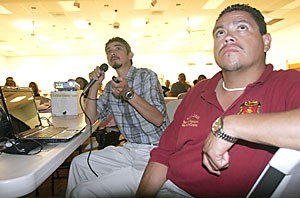A coalition of UA students and community members held a
benefit discussion Friday highlighting the strife of Mexico’s copper mine workers who are on a 45-day strike.
UA students and members of CoaliciÇün de Derechos Humanos want to help the miners of Cananea Local 65 with their demands, bring attention to international and local unions and perhaps impact global policy, said Helain Day, a Latin American studies and community health education junior.
The coalition is a human rights association that fights discrimination and helps people who are being abused by law enforcement, businesses or individuals, Day said.
Respect for union autonomy, compliance with previous law and environmental and safety measures are among some of the issues the miners demand.
“”I really wanted to do something with immigration and changing policy,”” said Zelida Hernandez, a Latin American studies senior. “”I really wanted to get involved in policy changes for that, because we really do have a strong political voice.
“”I’m actually from a border town, Nogales,”” Hernandez said, “”so I know what it’s like to see militarization and discrimination.””
Eric Pavri, a second-year law student who helped organize the event, said he wants to get involved with immigration and labor law when he graduates.
“”Last year a few students of the law school started volunteering at Derechos Humanos at a legal clinic,”” he said. “”We help people with all kinds of problems when they get abused at their workplace, by their landlords or sometimes when there’s abuse by law enforcement officials, particularly federal, customs and border patrol.””
At the event, the mineworkers showed a video of the working conditions in their copper mine in Cananea, a principal mining and metallurgical town 25 miles south of the Arizona-Mexico border.
The video displayed layers of dust and mud covering the work area, dangerous machines with no guardrails and large chunks of debris blocking access tunnels and emergency exits.
At the discussion, held at the Armory Park Community Center, 220 S. Fifth Ave., the mineworkers gave first-hand accounts of the disparities of their profession to the audience.
“”The conditions in Mexico are much worse than they are here,”” said Manuel Legua, a 26-year-old mine worker from Cananea. “”This is the reality of our situation.””
Thirteen-hundred mine workers have been on strike for 45 days, Legua said. In addition to the unsafe working conditions, the mine workers are on strike because of the poor health care offered by their employer, Grupo Mexico.
The mineworkers and their families, who make up about 15,000 beneficiaries, share one small hospital, he said.
There used to be a second hospital for the workers, but it was closed in 2000, so now the workers and their families must all use the same hospital, which has only one bathroom, Legua said.
The workers did not sit by and let it continue to happen.
Instead, they brought their case to the Mexican government, Pavri said, but the inspectors didn’t take their complaints seriously.
“”They said they were all minor problems when actually they are serious threats to the health and safety of the workers, in some cases life-threatening,”” Pavri said.
“”Because they exhausted their legal options going through the government, they had to take political action, and strike instead,”” he added. “”Rather than a legal strategy, it’s more of a political strategy.””
Pavri said anyone can join CoaliciÇün de Derechos Humanos, regardless of whether or not they speak Spanish.
The coalition’s goal is to create an equal opportunity for the workers, who are trying to earn a decent living for their families, Pavri added.
“”We’re trying to fight to make sure that people have that opportunity.””









